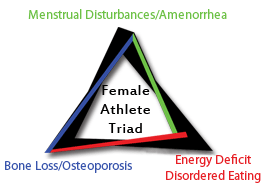
A lot of athletes realize the benefits of intense training and a disciplined diet. "Practice Makes Perfect" and "You Are What You Eat" are common idioms that we've all heard while preparing for our sport, encouraging a hard work ethic and healthy eating. There comes a time, however, when we need to ask ourselves—how much is too much?
Female athletes can often times go from trying to be healthy and fit for their sport to being at risk for a problem called female athlete triad. Female athlete triad is "related to females and athletics, with specific attention to amenorrhea, osteoporosis, and eating disorders." [1] Women may suffer from only one of these conditions, such as amenorrhea (or the absence of a menstrual period), or they may suffer from all three. Often times, female athlete triad is seen in women participating in sports that emphasize leanness or low weight, such as track, gymnastics, or swimming.
With parents encouraging their children to play sports at a young age coupled with the increased competitiveness in sports, girls are at risk for female athlete triad extremely early in life. In an article written for the Clinics in Sports Medicine, Michael Brunett II talks about how to manage female athlete triad successfully—and it all beings with preventing the condition from occurring. "Prevention can best be accomplished through athlete education and creation of a caring environment sensitive to these types of concerns." [2] As an athlete, it is important to have a strong support group around you. For girls at risk for female athlete triad, that support group should consist of parents, coaches, trainers, nutritionists, and health care professionals—to name a few.
In all sports, weight is an important factor—ranging from losing weight to be considered a lightweight rower to gaining weight to play certain positions on a football team. However, it is necessary to go about weight control in a healthy and educated way. For many young girls, female athlete triad is an extremely serious problem that can affect them for the rest of their lives. Coaches and parents should always be educated about the health risks involved with the sports their children are playing, and know when to step in. Hopefully, education will lead to prevention, and prevention will lead to a much happier and healthier female athletic community.
[2] Ibid, 632.
[1] Michael Brunett II, PhD, ATC/L, CPT, STS, "Female Athlete Triad," Clinics in Sports Medicine, (2005), 623-632.

